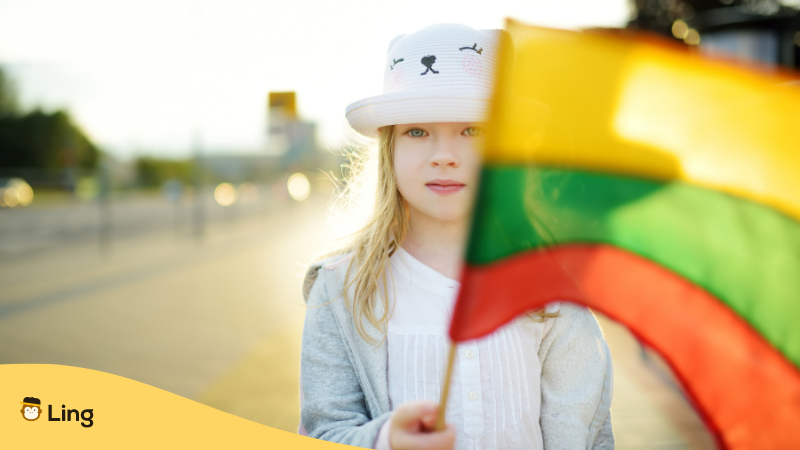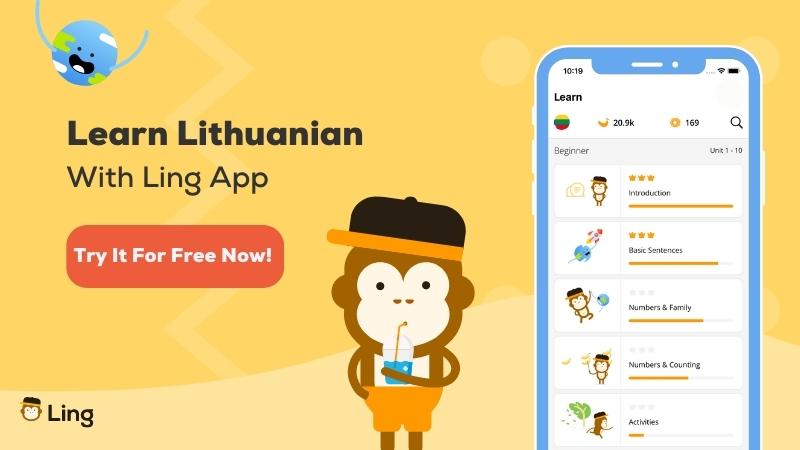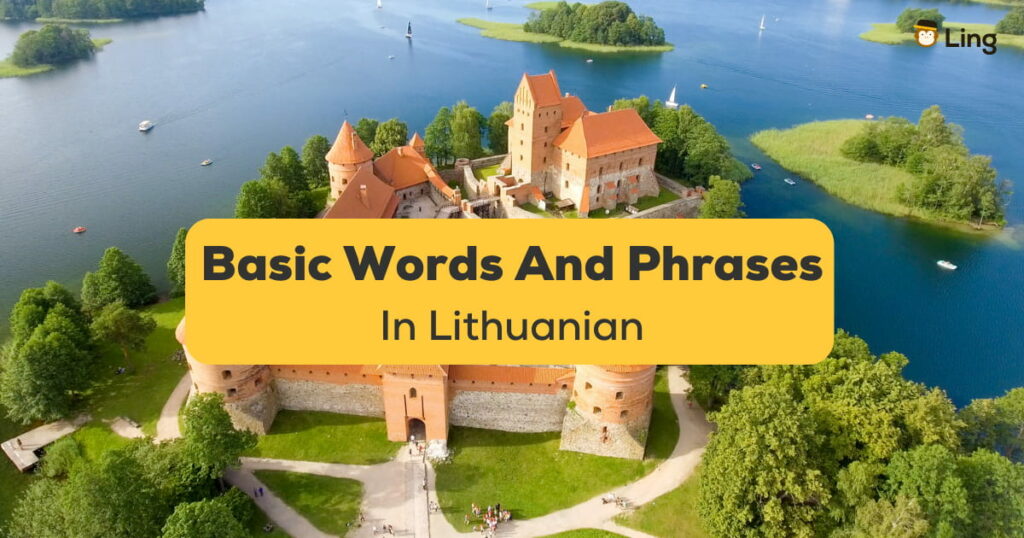Learning basic words and phrases in Lithuanian (Lietuvių kalba), such as Labas and Labas Rytas is an honor. Want to know why? Although there are only about 3 million Lithuanian speakers, making it one of the least common spoken languages in Europe, learning this language will be helpful, especially when you are planning to go to Lithuania.
You don’t have to be as fluent as native speakers. Learning a handful of basic words and phrases in Lithuanian, starting from simple greetings like Hello down to more complicated words, phrases, and sentences, will open doors for a deeper understanding of their amazing culture.
Introduction About Lithuanian Language
With fascinating tourist attractions and mouth-watering pastries down to its fascinating history, how can you not fall in love with the country of Lithuania? Among all of these things, Lithuania has its own gem that they have treasured for a long period of time, and that is their language – Lithuanian (Lietuvių kalba). So, what exactly is Lithuanian?
Lithuanian belongs to the Baltic languages together with Latvian. In the past, there were more languages that were included in this language family, such as Galindian, old Prussian, Yotvingian, Skalvian, Selonian, and Semigallian. Haven’t heard any of those languages? It is understandable because they are now extinct. Did you know that linguists considered Lithuanian to be the oldest surviving Indo-European language? From here, you can simply say that Lithuanian is a very old but interesting language since it manages to remain up until this day.
Basic Words And Phrases In Lithuanian
Whether you are planning to go on a trip to Lithuania or you just want to learn Lithuania for personal reasons, these words, phrases, and expressions are a good way to start with. You may hear some locals who speak English, especially the younger ones, but it is nice to know some Lithuanian words and phrases. Here are some of the basic words and phrases in Lithuanian:
1. Hello / Hi- Labas
Pronunciation: lah-bahs
Just like in any other language, learning basic greetings is one of the life hacks in traveling. This is a good conversation starter that can be used in many situations.
2. Good Morning – Labas Rytas
Pronunciation: lah-bahs ree-tahs
Greeting Labas Rytas / Good morning in English is one of the most common ways to start the day. It will be perfect to say this while having a nice breakfast and eating some delicious Lithuanian pastries like Medaus Tortas (Honey Cake). We all know that a simple greeting such as Good morning may brighten up someone’s day, so it is a good investment to learn this.
3. Good Evening – Labas Vakaras
Pronunciation: lah-bahs vah-kah-rahs
Just like Good morning, Good evening (Labas vakaras ) is also important. This can be used to greet someone in the evening. This will really come in handy especially if you are going to experience the nightlife in different places in Lithuania like Bambalyne and Alaus Biblioteka.
On the other hand, to say Good night in Lithuanian, use Labos nakties / Labanakt. This is a nice way to end the night with someone.
4. Thank you – Ačiū
Pronunciation: ah-choo
Did you know that Lithuanians are naturally hospitable? They will gladly welcome you to their country like you are a family. To show your gratitude, you can say Aciu (Thank you). This is one of the most important Lithuanian expressions that you need to learn, especially when you are traveling.

5. Goodbye – Viso Gero / Bye – Sudie
Pronunciation: vee-saw gheh-raw / soo-dyah
Upon leaving Lithuania, you will surely have to say farewell to such a wonderful country. Viso Gero is the Lithuanian term for Goodbye, but you may also hear Sudie, which means Bye in English. This is more informal and casual than the first one. Another casual way of saying this isIki pasimatymo! Which means “See you later” in English.
6. Sorry / Excuse me – Atsiprašau
Pronunciation: ah-tsih-prah-shaoo
There will also be times when you need to say sorry or excuse me, given that you are not a local citizen. Atsiprašau is the right word to use. However, to beg pardon, use Atleiskite, which is also translated as Excuse me in English.
7. Please – Prašau.
Pronunciation: prah-show
Lithuanians are also known to be polite and respectful. They are holding up to their values. Saying Prašau. (Please) is a common way to express politeness, especially if you are not familiar with their culture.
8. Yes- Taip / No- Ne /Maybe – Gal / Okay- Gerai
Pronunciation: tayp / na / gal / geh-rai
These four words are short but very essential, especially if you don’t know how to speak Lithuanian. Although you can use some non-verbal cues like nodding and thumbs up, these four words are not that hard to learn. These words will really help you survive your whole travel experience.
9. My Name Is – Aš esu / Mano Vardas Yra ______ .
Pronunciation: mah-naw vahr-dahs ee-rah _____ .
As a foreigner, don’t miss an opportunity to be friends with the locals. Lithuanian people are really hospitable. In case you have to introduce yourself, you can use Aš esu / Mano Vardas Yra ______. Having a lot of friends will make you want to come back more.
10. How Much Does This Cost? – Kiek Tai Kainuoja?
Pronunciation: kyek tai kai-nwah-yah
What kind of trip is it without shopping? This is one of the must-learn expressions that will surely help you while shopping at the local shops in Lithuania like Akropolis and RYO.
Upon learning these, you will definitely survive your whole trip. For starters, these words will really go a long way, but if you want to really dive into learning their native language, there is a lot more to learn.

Other Words And Phrases In Lithuanian
Here are some additional basic words and phrases in Lithuanian for you to learn to expand your vocabulary:
Greetings In Lithuanian
| English Translation | Lithuanian |
| Welcome! (greeting on arrival) | Sveiki atvykę! |
| How are you? | Kaip gyvuojate? |
| I’m fine. | Man viskas gerai. |
| How do you do? | Kaip sekasi? |
Comprehension In Lithuanian
| English Translation | Lithuanian |
| Do you speak English? | Ar kalbate angliškai? |
| I can’t speak Lithuanian [well / fluently] | Nekalbu [gerai / laisvai] lietuviškai |
| Is there someone here who speaks English? | Ar kas nors čia kalba angliškai? |
| I don’t understand | Nesuprantu |
Travel And Directions In Lithuanian
| English Translation | Lithuanian |
| left | kairė |
| right | dešinė |
| straight ahead | tiesiai |
| …the train station? | …traukinių stoties? |
| …the bus station? | …autobusų stoties? |
| …the airport? | …oro uosto? |
| How much is a ticket to _____? | Kiek kainuoja bilietas iki |
| One ticket to _____, please. | Prašau vieną bilietą į _____. |
| Where is the toilet? | Kur yra tualetas? |
| I’m lost | Pasiklydau |
Lithuanian Words For Food And Dining
| English Translation | Lithuanian |
| Can I look at the menu, please? | Gal galėčiau gauti meniu? |
| A table for one person/two people, please. | Stalą vienam/dviems, prašau. |
| May I have some _____? | Ar galėčiau gauti šiek tiek _____? |
| Is there a house specialty? | Ar turite firminių patiekalų? |
| Bring me the check, please. | Galite atnešti sąskaitą. |
| It was delicious. | Buvo labai skanu |
| Cheers! Good Health! (Toasts used when drinking) | Į sveikatą! |
Shopping
| English Translation | Lithuanian |
| Do you have this in my size? | Ar šitą turite mano dydžio? |
| How much is this? | Kiek tai kainuoja? |
| That’s too expensive. | Tai per brangu. |
| OK, I’ll take it. | Gerai, aš tai paimsiu |
| I can’t afford it. | Negaliu sau to leisti. |
Numbers
| English Translation | Lithuanian |
| vienas | 1 |
| du | 2 |
| trys | 3 |
| keturi | 4 |
| penki | 5 |
| šeši | 6 |
| septyni | 7 |
| aštuoni | 8 |
| devyni | 9 |
| dešimt | 10 |
It is no secret that the Lithuanian language is one of the oldest language Indo-European languages. There is a reason why this language survives even though other languages have become instinct. Lithuanians are known for their love for their country, which must be why they managed to sustain their language. Lithuanian, no matter how small the population who speaks it, binds the people together as one.

Learn More Lithuanian With Ling App
“Maža garbė svetimom kalbom kalbėti, didi gėda savos gerai nemokėti”. This is a famous quote from one of the most influential Lithuanian linguists which means “There is no honor in speaking a foreign language; there is a great shame in not knowing your language perfectly.” This is just proof of how proud they are of their language. Now that you have learned the basic words and phrases in the Lithuanian language, what’s next?
If you want to be part of the 3 million Lithuanian speakers, the Ling app is a perfect partner for you to start with. The Ling app will provide you with fun and engaging lessons that are convenient for learners. You can also learn the correct pronunciation of each word because of the audio examples. Games are also utilized for you to have fun while learning.
You don’t have to attend scheduled classes because by just using your phone or computer, you will be able to have learned not just Lithuanian but many different languages as well. You can also read blog posts like this to know more about the language.
What are you waiting for? Start learning Lithuanian now! Download the Ling app on the Play Store or App Store to unlock your potential.



































































One Response
Very useful site !
Please keep going with more info !